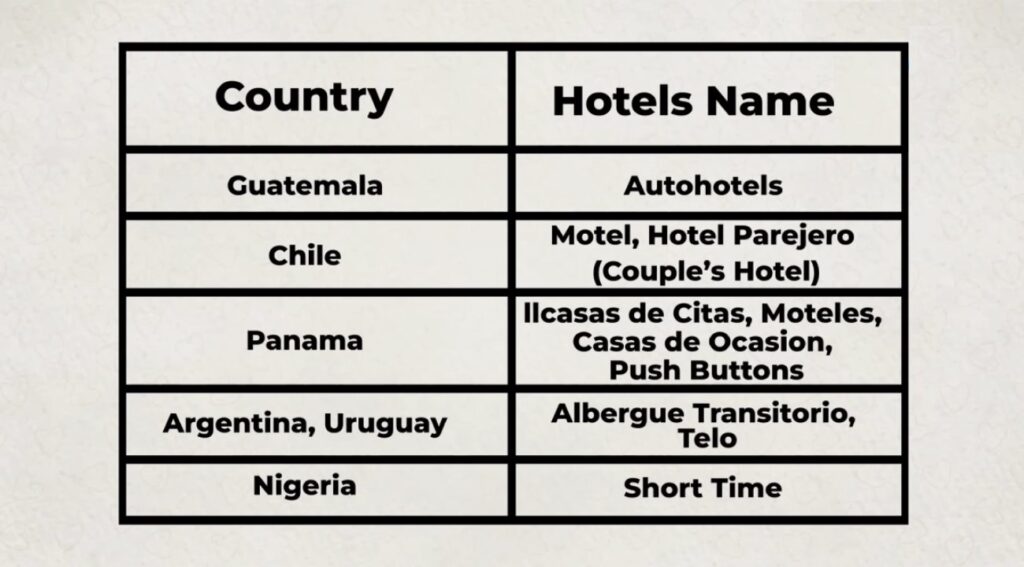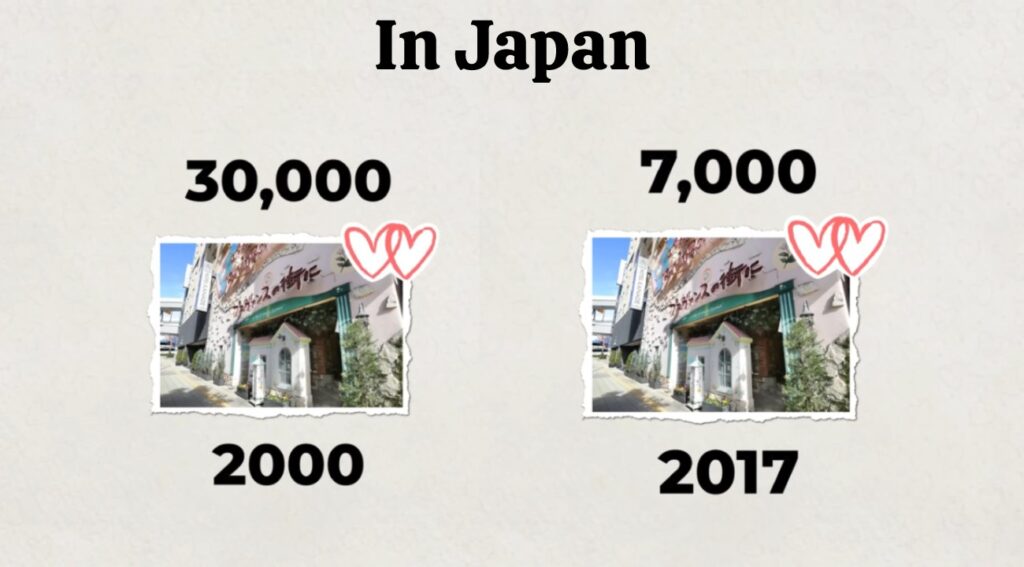Table of Contents
Love Hotel is one of the most preferred places for travelers for short-term accommodation. Besides tourists, young couples also frequently go to such hotels where they can rent rooms by the hour. Although the love hotel started in Japan in 1968 as a place for prostitution and young lovebirds to spend some time alone, these hotels have now spread worldwide.
Low-budget travelers have the highest demand for stay-overs in love hotels because such hotels also provide shared accommodation systems, reducing the cost of staying for travelers. Generally, the resting period is one to three hours long, and in case of an overnight stay, the rent is calculated from 10 pm till check out the following day. Love hotels are also famous for their multi-level privacy. Love hotels tend to be more frequented by couples due to private parking lots, restricted entrance options, low surveillance, online payment systems, and other private systems.
History Of Love Hotel
Japan
Love hotels were introduced in Japan around the 1700s. During Japan’s Edo period between 1603 and 1867, there were secret tea houses in which sex workers performed songs, dances, and physical intimacy for guests. After World War II, a reconstruction phase was underway throughout Japan from the 1950s. At the time, construction companies were hiring large numbers of workers, causing a huge labor force coming from rural areas to move to cities in search of work.
Then construction companies built many hotels to provide accommodation to their workers. Later, it became a place where couples of any age could come and spend some time alone. Because Japanese houses in the 60s were small and Japanese people lived as joint families. Due to many people in the house, married or unmarried couples did not have the opportunity to spend time alone at home. This is where the “Love Hotel” concept originated.

South Korea
After the 1988 Olympic Games, Love Hotel became popular in Seoul, the capital of South Korea. On the occasion of the Olympic Games, the government permitted Love Hotels as accommodation facilities for tourists coming from different countries of the world. But in September 2004, the Korean government ordered a crackdown on prostitution in Love hotels and ordered the hotels to be used for normal operations.
Other Countries
In other Asian countries such as Singapore, Hong Kong, Taiwan, and India, love hotels have become popular for providing almost similar services. Although in different countries of the world, especially in South African countries, these types of hotels are known by different names.

Rise Of Love Hotel
Japan
In the early 2000s, there were about 30,000 love hotels in Japan, and since then this number has gradually declined. In 2009, an average of 2 million people visited Love Hotels every day, generating about 4 trillion yen in revenue that year. Due to various demographic and behavioral changes, the number of Love Hotels fell to 7,000 in 2017.
According to the United Nations World Population Prospectus, the number of young people aged 20 to 29 in Japan has fallen by 33% over the past two decades. Generally, people of this age group are more sexually active. According to a survey report by Japan’s National Institute of Population and Social Security Research, interest in sexual activities among Japanese youth has decreased. This is the main reason for the decrease in the number of love hotels. In the middle of the last decade, however, the love hotel business started to revive due to the influx of tourists from different countries. But due to Corona Pandemic, the growth of this sector has been interrupted again.

Korea
In South Korea, young adults live with their parents until marriage. Due to this reason, the popularity of Love Hotel among the youth of the country has increased to a great extent. Also, with South Korea being a travel destination, love hotels became known as a very profitable business.
In 2004, South Korea passed an anti-prostitution law to make sex trading illegal. Such a decision of the government threatened the love hotel industry of the country. At that time, South Korean citizen Sujin Lee used this opportunity to create an online platform called “Yanolza.” Basically, this platform is used to publish hotel ads online to attract new guests.
Later in 2007, he launched Yonolza as a full-fledged accommodation booking facility platform. By 2019, more than 20,000 hotels were registered under the platform, accounting for 40 percent of South Korea’s total hotel business, generating revenue of $4 billion annually. So far, Yonolza has received investments of about 2 billion dollars from organizations like SoftBank, Sky Lake Investments, and Booking Holdings Inc.

India
Indians are ethnically a bit conservative, which has led to a lot of momentum to establish the Love Hotel concept in India. Hotels in India ask couples to prove they are married when they try to book a hotel room to spend some quality time together. Also, based on the information, if the hotel authorities understand that the couple lives in the same city, then they are asked to justify why they want to book the hotel room even though they are married. So a slightly different approach had to be taken to establish love hotel accommodation facilities in India. Oyo Rooms has made a special contribution as an industry pioneer in this field.
In 2016, they bought ZoRooms to expand the business. Also, competitors like Treebo Hotels and Fab Hotels are also contributing to growth in this sector with funding from investors like Accel Partners, Qualcomm Ventures, and Bertelsmann India Investments. Among all aggregators, Oyo Rooms is ahead as they offer various facilities, including 6 am check-in, and room booking for unmarried couples. Others are also adopting these methods, due to which the expansion of love hotels in India is gradually increasing.

Like other start-ups, the love hotel industry is also being led by Indian youth. StayUncle’s name is particularly mention-worthy as they made an enviable debut in conservative India with a bold move. The company started in 2015 with a short-time stay-over facility for business persons only.
Currently, the startup is offering hassle-free check-in and check-out for married couples as well as the assurance of staying over in a safe and couple-friendly environment. Apart from regular couples, StayUncle also offers similar services to homosexual couples. No complaints or negative reports of harassment have been received so far in the name of hotels listed as partners in this startup.
In 2016, “OYO Rooms” followed the model of StayUncle and launched a “Relationship Mood” program where they facilitated hassle-free room bookings for customers. Earlier, as per the terms and conditions of Oyo Rooms, an unmarried couple could not book a room on this platform, but with the launch of this program, they got out of this condition.
Under Relationship Mood, unmarried couples can enjoy the facility of room booking with just a local ID card, and now this facility is available in more than 100 cities in India. Also, Oyo Rooms has become one of the preferred services for Indian couples to celebrate Valentine’s Day due to the variety of offers on Valentine’s Day. As a result, Oyo Rooms is slowly capturing most of the market in India in terms of providing stay-over accommodation facilities.










Leave a Comment